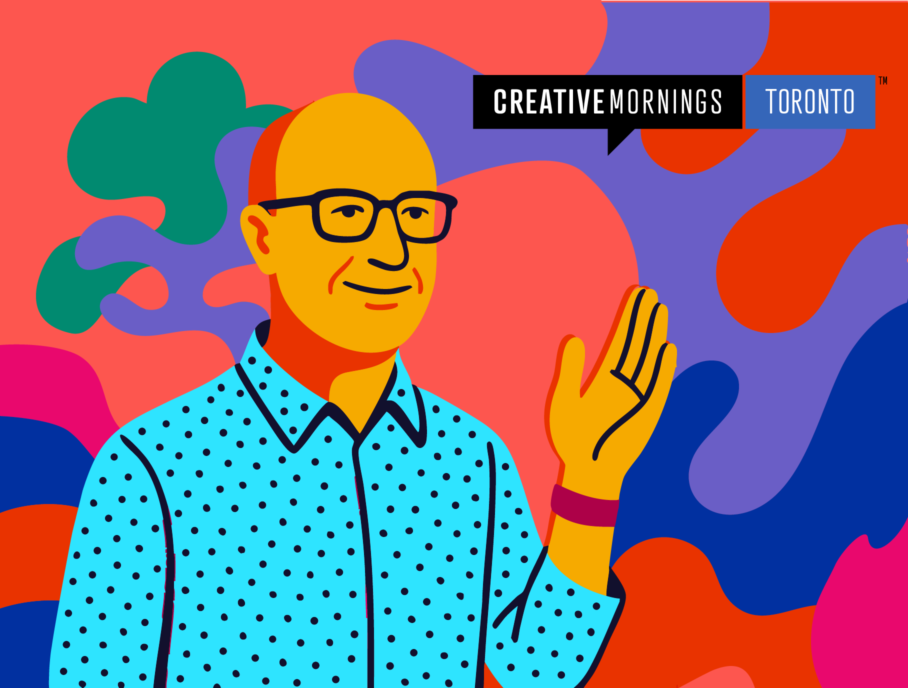Reviving Creativity: Imperfection, vulnerability and the power of “doing the thing”
Written by Lee Eldridge, University Lecturer (CUPE) at TMU

On a bright Friday morning, Dr. David Gauntlett, Canada Research Chair in Creative Innovation and Professor at Toronto Metropolitan University, took the stage at CreativeMornings Toronto to explore what it means to revive creativity.
With a blend of humour, heartfelt vulnerability and hard-won wisdom, David unpacked some of what holds people back creatively—and how they can move forward, especially when doubt, fear and perfectionism loom large.
The talk as creative practice
Rather than delivering a conventional talk, David embodied the very creativity he discussed. He began by sharing an original piece of music—his new single, “I’m Glad You Stayed Around,” written, produced and performed by himself—accompanied by a slideshow of curated clouds. Sincere and personal, it was a deliberately vulnerable moment: testing his own emotional resilience in a room full of strangers.
This vulnerability wasn’t accidental—it was thematic. “Doing the thing,” David emphasized, is key to creativity. And “doing the thing”—even when you’re scared, unsure or lacking confidence—is quite possibly the only way to keep growing.
Creativity is not a finite resource
At the core of David's message was a direct challenge to how many people conceptualize creativity. He critiqued the idea that creativity is an innate “amount of juice”—a sort of limited resource that some people have and others lack.
He says, “Creativity is something you do, not something you have at some sort of pre-determined level or capacity.
David argued that creativity behaves much like any other skill: it improves with time, effort and repetition. Just as no one expects a beginner to master tennis after a single game or an instrument after a single lesson, we shouldn’t expect ourselves—or anyone else—to be brilliant from the outset. The act of doing is what leads to becoming more creative.
Perfectionism: The false proxy for professionalism
David also explored the damaging link between perfectionism and professionalism. When beginning any creative endeavour—music, visual art, writing and design—creators often feel pressure to make it perfect, to prove they’re “professional.”
That kind of pressure stifles experimentation. Many people start with bold, unconventional ideas, only to slowly polish all the originality out of them in an attempt to fit expectations. You start thinking, “I want people to take this seriously,” and suddenly you're trying to meet invisible standards that pull you away from what excited you in the first place.
This tension is especially present in the digital era, where platforms reward conformity. “To get [your music] on playlists, you have to be doing a recognizable thing.”
He emphasized resisting perfectionism in favour of instinct and originality. Embrace the quirks, the risks, the weirdness—that’s where the magic lives. Waiting to feel ready before sharing your work can be a trap. Confidence comes through doing, not waiting. “Later doesn’t come unless you’re doing things.” Instead, move forward in spite of discomfort. “It’s by making yourself do the thing that you’ll feel more confident about it.”
Collaborate, but don’t skip the solo work
David acknowledged the current love of collaboration but warned against seeing it as inherently superior to solo creativity. “If a group of people are collaborating… if none of them has actually got anything interesting to contribute, it’s just a bunch of people desperately hoping that someone else has got the magic rabbit.”
Individual creativity, cultivated independently, is what gives collaborative efforts real value. “Individual creativity is actually a thing that we really, really, need to nurture.”
AI doesn’t threaten this kind of creativity
On AI, David was clear-eyed and optimistic. “Creativity is about personal flourishing and growth and connections and developing your sensitivity, developing your vulnerability.”
AI can generate text, music and images—but if the purpose of creativity is to understand ourselves, connect and process the world, AI is simply a tool. It may change workflows, but the heart of creativity remains human.
“Especially if the important thing is about personal growth and connection and community—the heart of what CreativeMornings is all about.”
It may not lead somewhere—and that’s okay
David concluded with reassurance: what if it doesn’t go anywhere? What if it fails?
“Something always leads to something.”
Even dead ends teach us, open doors or build connections. Creativity always moves you forward.
Final takeaway
Revival isn’t about restoring the old—it’s about reigniting the impulse to try, to be seen, to create. David's message is a timely reminder: in a world obsessed with perfection and algorithms, real creativity is messy, personal and often uncomfortable.
But deeply rewarding.
"You don’t need to be confident.
You don’t need to be perfect.
You don’t need to fit in.
But you do need to do the thing."
And as Dr. David Gauntlett showed—through clouds, chords and candour—that’s more than enough. Sometimes, the only way out is through. So keep going!
About CreativeMornings Toronto
CreativeMornings is a free monthly breakfast lecture series for creative communities in 240+ cities across 75+ countries. The Toronto chapter is co-hosted by Lee Eldridge and Ivan Wanis-Ruiz, in partnership with The Creative School at Toronto Metropolitan University.
For more, visit www.CreativeMornings.com/TO.

Lee Eldridge, Graphic Communications Management & Creative Industries at TM, Board of Directors, OPIA Co-Host, Creative Mornings Toronto
Lee Eldridge is a researcher and educator in graphic and creative communications with two decades of experience. Formerly Director of Advanced Technologies at CJ Graphics and Associate Editor of DesignEdge, he is now focused on industry trends and AI tools in creative professions. He co-hosts CreativeMornings Toronto.
Dr. David Gauntlett
Dr. David Gauntlett is Canada Research Chair in Creativity at The Creative School, Toronto Metropolitan University. He leads the Creativity Everything lab and has authored several books, including Creative Explorations, Making Media Studies, Making is Connecting and Creativity. He has worked with organizations such as the BBC, the British Library, Tate and LEGO and releases music under Sculpture Projects.
Mentioned in this article
Related Articles


John deWolf RGD, Diego Lopez RGD, Diana Campbell RGD, Karl Chen RGD, Magued Hanna RGD














